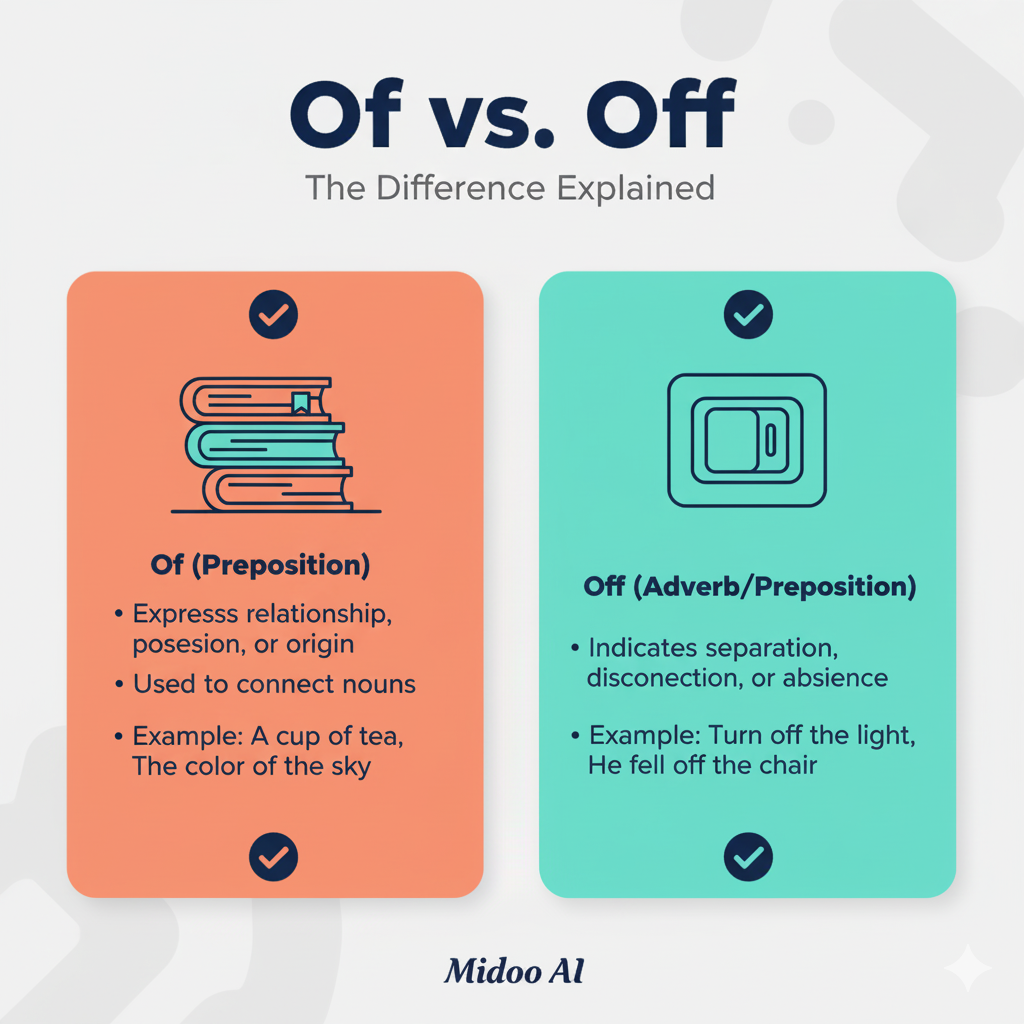Of vs. Off—How to Use Them Correctly

If you’ve ever written a message or spoken in English and paused to wonder whether you should use of or off, you’re not alone.
These two short words can be confusing for learners because they sound similar, and in fast speech, they sometimes overlap. That’s why many people accidentally type “off” when they mean “of,” and vice versa.
At Midoo AI, our mission is to help learners tackle exactly these tricky details in English. Understanding how to use of and off correctly will not only improve your grammar but also make your communication sharper and more professional. Let’s explore the difference in detail.
1. Meaning and Usage of Of
Of is a preposition that shows relationships—often possession, belonging, or composition. It connects a noun with another word in the sentence.
Examples:
- She is the leader of the team.
- A cup of tea is perfect in the morning.
- The capital of France is Paris.
Tips:
- Think of of as linking two things together.
- It often answers the question: “belongs to what?” or “made from what?”
2. Meaning and Usage of Off
Off can be both a preposition and an adverb. It indicates separation, movement away, or disconnection.
Examples:
- Please take your shoes off.
- The cat jumped off the table.
- Turn off the lights before leaving.
Tips:
- Imagine off as “not on” or “away from.”
- It usually shows removal, detachment, or leaving.
3. Common Mistakes Learners Make
Many English learners confuse the two, especially in writing. Here are some errors and corrections:
❌ Take the lid of the bottle.
✅ Take the lid off the bottle.
❌ The capital off Spain is Madrid.
✅ The capital of Spain is Madrid.
Tip: If the sentence is about possession, material, or relation → use of.
If it’s about separation, disconnection, or removal → use off.
4. Quick Memory Hacks
- “Of = belonging” → a slice of cake (belongs to a whole).
- “Off = away” → get off the bus (move away from it).
- If you can replace the word with belonging to, it’s of.
- If you can replace the word with away from or remove, it’s off.
5. Examples in Real Life Sentences
- She is afraid of spiders.
- He switched off his phone.
- A bag of rice was left in the kitchen.
- The paint is peeling off the wall.
6. FAQ
Q1: Can of and off ever mean the same thing?
Not really. While they sound similar, their meanings are distinct. If you use the wrong one, the sentence changes completely or becomes incorrect.
Q2: Why do people confuse them in speech?
In fast, connected speech, of can sound like “uhv” or even “uh,” which sometimes resembles “off.” That’s why confusion happens.
Q3: Is it ever okay to say “off of”?
Yes, but it’s informal and mostly used in American English. For example: He jumped off of the couch. In formal writing, just say off the couch.
Q4: Which word is more common in English?
Of is much more common because it connects ideas and shows possession. You’ll see it in almost every English paragraph.
Final Tip from Midoo AI
Whenever you’re unsure:
- Stop and ask, “Is this about belonging or removal?”
- If it’s about belonging/connection → use of.
- If it’s about movement/detachment → use off.
With practice, this distinction becomes natural. Tools like Midoo AI can help you test yourself with instant examples and corrections, so you’ll never hesitate over of vs. off again.